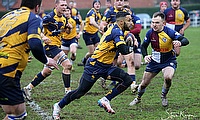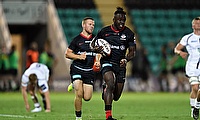'It's now a dog-eat-dog approach where the bigger clubs don't care if they put someone out of business'
"Brian said it is a waste of money paying players at levels three, four and five," begins Stuart Thresher. "I'm just adding in that when you're paying players at that level, there is a knock on effect."
Well-positioned to add his own opinion to this debate, the former Harlequins player is currently backs coach at level seven club Crowborough, a team which can certainly relate to the views of Brian Moore which were published in The Telegraph last month.
The ex-England international was commenting on the demise of Worcester Warriors and Wasps which has led to more calls to reform the top of English rugby, and the 60-year-old also feels any changes should filter down the pyramid.
Moore believes the Rugby Football Union's regulations to allow clubs who compete in tiers three, four and five to spend up to "£250,000, £125,000 and £50,000 per season" on paying players is a "criminal" waste of money which should be spent in far better ways.
His views sparked some controversy on social media. Some connected to clubs in the National Leagues [levels three and four] felt Moore's thoughts couldn't go unchallenged. Everyone is entitled to their opinion but one point which Moore did raise was how 'these payments' distort the stability and the sustainability of teams in the lower leagues.
Crowborough ply their trade in Counties 1 Kent and before the pandemic, they were making steady progress up the rugby ladder. However this season, Thresher admits it has been a struggle with factors - including the lack of player availability - proving difficult.
Already, the club have conceded a walkover result this term and scratching around to piece together a 1st XV for a weekend is becoming a recurring and unwanted theme.
"We can't normally pick a team until Friday morning," Thresher says. "Pre-Covid, we were putting out definitely two, three sides and punching above our weight but now we are struggling at the bottom, putting out one/two sides. Yes, the pandemic has had an impact but bigger clubs now require more players because of fixtures, injuries etc."
Despite the RFU flattening the league structure for tiers three and below for 2022/23 - which has seen a decrease in the number of matches played and, in most cases, less travel for clubs - Thresher was keen to highlight that 24 to 26 games per season is still too excessive and that level of commitment means teams higher up are having to bolster their squads.
In turn, it is slowly puncturing the ambition of clubs lower down the pyramid.
"Number of games, the level of injuries all adds up to clubs paying to try and stay at levels four and five meaning they need more players," Thresher says.
"We were looking at a level four club the other day and they had 58 players on their website in their first-team squad. That is astonishing. Our first team at Crowborough, who are playing 22 league games, is about 27 and then you are really dropping off a cliff. We've had 10 injuries at the moment and we are struggling to fulfil fixtures. We only need another one or two in the front-row and we're pulling out. We've already had to do that.
"It's now a dog-eat-dog approach where the bigger clubs don't care if they put someone out of business and the RFU exacerbate it."
The ability to pay players - with Thresher using the example of £250 per game - is damaging clubs like Crowborough and it is a serious problem when it comes to retaining and building a squad.
It also makes it doubly hard to contend with when players move to other clubs in the same area and in Thresher's view, where once local teams would love thy neighbour, that sentiment seems to have vanished.
"I'd say in the last 10 years, there has been one major club in our area that's been paying at level four but now there are three in level four and five within half an hour of us," he says. "They are always on the lookout for players elsewhere. The old rugby family spirit where we would have friendly rivalries with local town sides, but you would never poach their players? Now these clubs use us as a feeder club.
"I am not going to name names but one guy a few years ago was trying to poach one of our youngsters. It was a blatant phone call on a Sunday afternoon asking him to come and play for a different side. He hadn't done his homework because the kid he was talking to was the stepson of the Director of Rugby at Crowborough who was sitting on the sofa next to him at the time!
"Look, when you are struggling, your players will get approaches to go and play higher up, with the promise of cash and this, that and the other. If you are doing well and you could get promoted, everyone starts looking at you and they say; 'what have they got over there which can be of use to us?' You get decapitated when you start playing some decent rugby as well.
"We won't play a pre-season warm-up game against any of the local side's 2nd XV's. We just believe they will use it more as a recruitment exercise than a genuine friendly. They read our reports, whoever gets man of the match, they will get a Facebook friend request from another coach. Some clubs in the area have stopped putting their reports on their website. They don't want other clubs to know who their better players are. It is sad, really."
Thresher is quick to add he isn't against players being ambitious though, with he himself rising through the ranks to represent Harlequins. Closer to home, TRU's Max Ashcroft and Max Skofic started at local club Tarleton before going on to play National Two North rugby for Sedgley Park. The latter has also graced the international stage with Slovenia.
"I am all for a player being ambitious because that is precisely what I did myself," Thresher confirms. "The one thing that I would say is that in the past, a player would be pretty sure that he has cracked it at the level he is playing at before he goes to another club. You have now got people saying; 'come and play for us because there is no downside playing for the 2s and if you get in the 1s, it is £250.'
"Over the last four years, we have lost seven or eight players to other local clubs and probably only two of those are playing regular first-team rugby. By taking the paying of players out, Brian and myself would be pretty unpopular but the RFU has to look at the overall standing of the game."
Despite agreeing with Moore's main stance, Thresher is aware that clubs lower down the chain are not just suffering because of player payments.
Referring back to the structure of the leagues, he believes starting the season right at the beginning of September is putting sides like Crowborough immediately on the back foot while the inclusions of 2nd XVs within the divisions is also devaluing the offer of staying with a 'smaller' club.
"At level seven this season, the RFU moved the season forward for us by two weeks," he explains. "It started on the 3rd of September and what that meant was the first game was called off. We had a hot summer and we were playing on hard pitches, but it is not just playing on the 3rd of September on a hard pitch. It is your warm-up games which are now in August. You are playing on a rock-hard pitch and that means you can do limited physical contact training so you are barely prepared.
"These are recreational players so there is a certain amount of commitment they will give. They are playing early in September. You have still got summer hospitality on, weddings, and guys going on holiday or still away so we start understrength. You then get injuries and then you remain understrength for weeks.
"Also, because the first game was cancelled because the pitch was just like concrete, that then condemns a level seven club with 27 first-team members to play 14 league fixtures in the next 15 weeks. With Covid and everything not helping our cause, it is crazy.
"The RFU also allowing 2nd XVs in the same league structure, they have really weakened the case to stay at a smaller town side because if someone came after you from a bigger club, you will be playing a similar standard of rugby in the league system and if you get into the firsts, they will pay you £250, for example. I don't know who polices that. It all adds up for little protection for the smaller clubs who still do have decent junior sections. It is not just the senior side who will lose. It is the junior sections too."
So what can the RFU do to improve the game in Thresher's eyes?
"I think the RFU have got several issues. They have got to look at payment for players all the way through. You then see Worcester and Wasps going bust. That is shocking. If that happened to Harlequins, I would be distraught. You see the problems at the top but there is a knock on effect which goes all the way down.
"Look, you need a top tier. You have to support a pathway for players, ambitious players to reach the top. It is just a question of how big you want the pinnacle of the sport to be.
"When you watch the Premiership, it is great. I would suggest the Premiership is better entertainment than international rugby. It is a tough sport and it takes a certain type of person to want to play it so you have to make it attractive so more people want to play and that is something the RFU have to solve.
"It is breaking itself [trying to focus on the Premiership and England]. The RFU have got some difficult decisions to make about how far down they support the game. They should support it all the way down. That is the whole point of being a member of the RFU otherwise clubs might as well just do their own thing but feels like, at times, we are doing that anyway."





.jpg)


